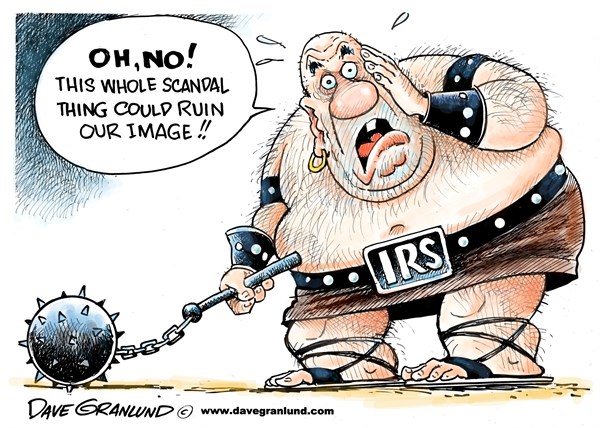In a remarkable admission that is likely to rock the Internal Revenue Service again, testimony released Thursday by House Ways and Means Committee Chairman Dave Camp reveals that an agent involved in reviewing tax exempt applications from conservative groups told a committee investigator that the agency is still targeting Tea Party groups, three months after the IRS scandal erupted.
In closed door testimony before the House Ways & Means Committee, the unidentified IRS agent said requests for special tax status from Tea Party groups is being forced into a special “secondary screening” because the agency has yet to come up with new guidance on how to judge the tax status of the groups.
In a redacted transcript from the committee provided to Secrets, a Ways & Means investigator asked: “If you saw — I am asking this currently, if today if a Tea Party case, a group — a case from a Tea Party group came in to your desk, you reviewed the file and there was no evidence of political activity, would you potentially approve that case? Is that something you would do?”
The agent said, “At this point I would send it to secondary screening, political advocacy.”
The committee staffer then said, “So you would treat a Tea Party group as a political advocacy case even if there was no evidence of political activity on the application. Is that right?” The agent admitted, “Based on my current manager’s direction, uh-huh.”
Camp called the renewed targeting of Tea Party groups “outrageous.”
Added a committee aide, “In plain English, the IRS is still targeting Tea Party cases.”
During 2010-2012 period when the anti-Obama Tea Party groups faced special scrutiny from the president’s IRS, agents used a “be on the lookout,” or BOLO, list which said groups with words like “Tea Party” in their title should face special, secondary screening for political activities that might hamper their special tax status.
When the scandal erupted after a Treasury Department inspector general revealed the improper political scrutiny, the acting head of the IRS, Danny Werfel, said the BOLO list had been suspended. That was six weeks ago.
But because there is nothing in its place, agents apparently either don’t know how to handle Tea Party tax exempt applications, or are too scared to make a decision.
Asked by the committee how it handles Tea Party applications, the agent said, “If a political advocacy case came in today, I would give it — or talk about it to my manager because right now we really don’t have any direction or we haven’t had any for the last month and a half.”
Camp, the Michigan Republican, told Secrets, “It is outrageous that IRS management continues to target Tea Party cases without any justification. The harassment, abuse and delays these Americans have faced over the last few years has been unwarranted, unprovoked and, at times, possibly illegal. The fact that the IRS still continues to treat the Tea Party differently and subject them to additional targeting is outrageous and it must stop immediately.”
In response, the IRS reiterated Werfel’s pledge to not target groups because of political labels. “The IRS has taken decisive action to eliminate the use of inappropriate political labels in the screening of 501(c)(4) applications. We look forward to seeing the full transcript to gain a fuller understanding of the context of the interview,” they said early Friday.
Werfel, called in to fix the scandal, directed the IRS to eliminate the use of BOLO lists. The statement said that “IRS policy is now clear that screening is based on activity, not words in a name. The new steps and current policies…specifically spells out that political campaign intervention will be reviewed without regard to specific labels. The IRS will not tolerate any deviation from this.”
In an IRS review, the plan was that after the BOLO lists were removed, political labels would be ignored by the “Determinations Unit” as they screened for information for those seeking tax exempt status.
– – – – – – – – – –
Below is the Ways & Means Committee transcript of the IRS official.
Wednesday, August 1, 2013
Committee: Today, currently, how do you analyze advocacy cases. If, for example, Tea Party of Arkansas came in today, how would you handle it?
IRS agent: Well, the BOLO list doesn’t exist anymore.
Committee: Sure.
IRS: If a political advocacy case came in today, I would give it — or talk about it to my manager because right now we really don’t have any direction or we haven’t had any for the last month and a half.
– – – – – – – – – –
Committee: If you saw — I am asking this currently, if today if a Tea Party case, a group — a case from a Tea Party group came in to your desk, you reviewed the file and there was no evidence of political activity, would you potentially approve that case? Is that something you would do?
IRS agent: At this point I would send it to secondary screening, political advocacy.
Committee: So you would treat a Tea Party group as a political advocacy case even if there was no evidence of political activity on the application. Is that right?
IRS agent: Based on my current manager’s direction, uh-huh.
. . . . . . . . . . . . . .
Paul Bedard is The Washington Examiner’s “Washington Secrets” columnist.

